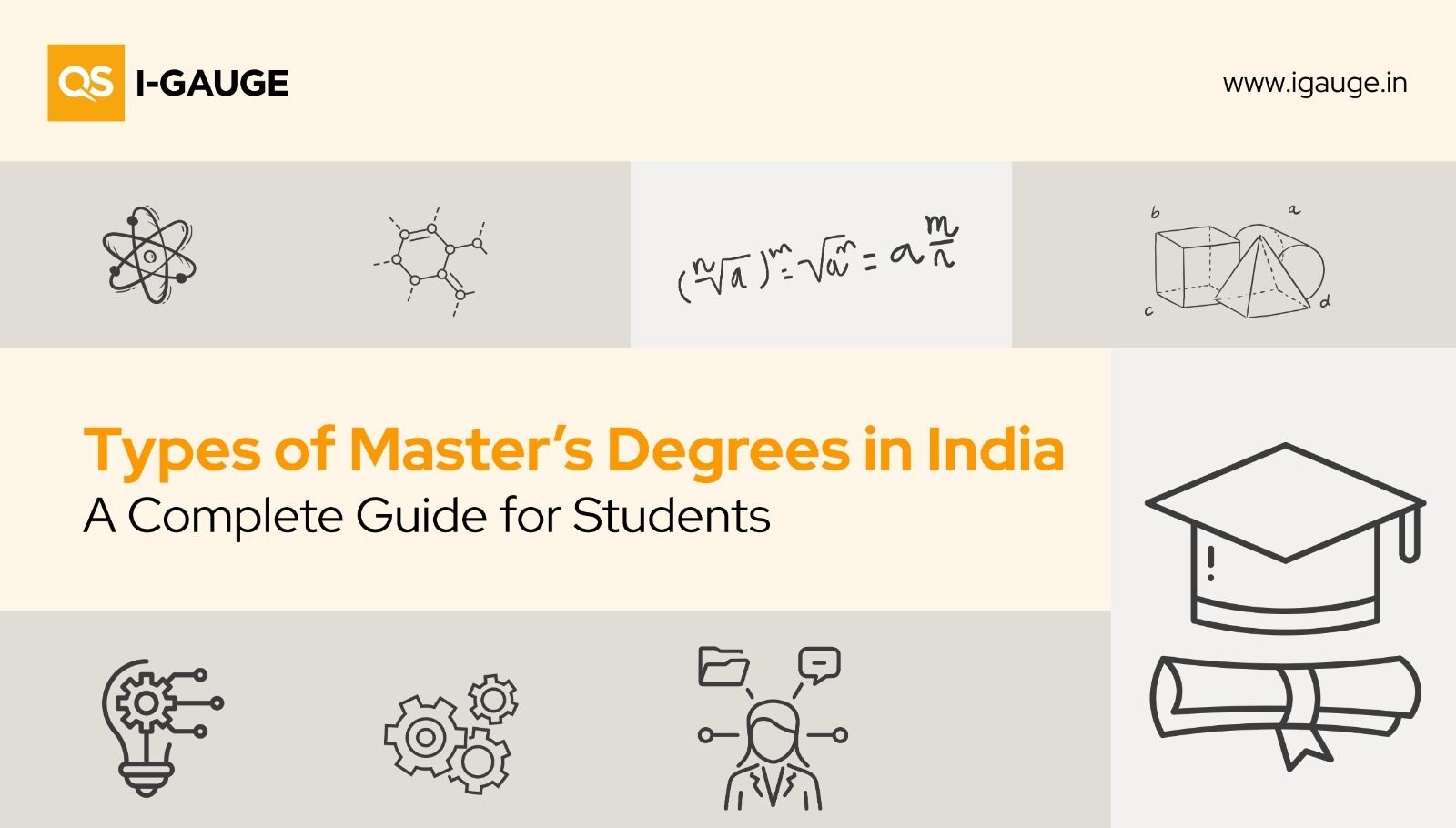
Working professionals achieve their academic goals through Master’s degree programs, which enable them to enhance their skills and acquire new competencies for career advancement. The postgraduate qualifications exist in multiple forms, which serve to fulfil various academic and professional needs.
Why Pursuing a Master’s Degree Matters in India?
A master’s degree in India serves multiple purposes because it allows students to gain advanced knowledge while creating better career prospects and specialised skills in their chosen subject area. The program gives students an edge in job markets, leads to leadership roles, and specialised skill development for career progression. The certification serves as a requirement for research, teaching positions, and global opportunities, which lead to long-term career development.
Overview of Master’s Degrees for Students
A Master’s degree represents a postgraduate academic program that spans from one to three years, based on the specific field of study and educational establishment. Students who want to select their master's degree program need to understand the different types and match their career objectives between research and professional practice, or their combination.
Types of Master’s Degrees
1. Master of Arts (MA)
The MA degree exists in the humanities and social sciences fields, which include literature, history, political science, sociology and languages. Students need to develop their critical thinking skills through the study of theoretical concepts in this subject. Students who want to work in education, research, or cultural fields in India usually choose to pursue an MA degree.
2. Master of Science (MSc)
Students who study Physics, Chemistry, Mathematics, Biology, Computer Science, or Environmental Science fields choose the MSc degree as their preferred option. MSc programs combine scientific research with hands-on experimental work. The MSc degree attracts numerous Indian students who aim to work in research facilities, IT organisations, and pharmaceutical businesses.
3. Master of Commerce (MCom)
The MCom is a professional master’s degree focused on commerce, finance, accounting, and business studies. The program serves as the preferred choice for Indian students who wish to work in banking and finance sectors, as well as accounting firms and corporate organisations. The program teaches students about taxation, auditing, as well as financial management and economics.
4. Master of Business Administration (MBA)
The MBA stands as a highly popular professional degree that helps students achieve leadership and management roles in various business sectors. Indian students choose MBA programs to acquire knowledge in business strategy, marketing, finance, human resources, and operations management. The MBA program includes specific areas of study, which include Finance, Marketing, Human Resource Management, and International Business.
5. Master of Engineering or Technology (MTech)
MTech degrees cater to engineering graduates looking to deepen technical expertise in specific engineering disciplines such as mechanical, civil, electrical, or computer engineering. These degrees combine theoretical knowledge with practical applications and are highly valued in India’s engineering and IT sectors.
6. Master of Education (MEd)
The MEd degree is designed for those who wish to pursue advanced careers in education, including teaching, administration, and policy-making. Indian educators often pursue MEd to enhance their pedagogical skills and knowledge of educational theories and technologies.
7. Master of Social Work (MSW)
The MSW is a professional degree for students interested in social work, community development, and public welfare. The program teaches students to work in NGOs, government social services, and counselling roles.
8. Master of Laws (LLM)
The LLM is a postgraduate law degree focusing on specialisations such as corporate law, international law, human rights, or intellectual property law. Law graduates in India pursue LLM degrees to increase their expertise and career opportunities in legal practice or academia.
9. Master of Fine Arts (MFA)
The MFA stands as a creative arts master's degree program, which includes visual arts, performing arts, creative writing, and design. The program provides excellent opportunities for Indian students who want to work in art, theatre, film, and design fields.
10. Master of Research (MRes)
The MRes program focuses on developing research skills through the creation of research designs, data collection, and analysis methods for a specific area of study. Students work on a major research project or thesis while receiving guidance from their faculty members. The degree is often a precursor to doctoral studies.
11. Master of Philosophy (MPhil)
Similar to the MRes but with a more intensive focus on independent research, the MPhil requires students to produce a substantial thesis. The program functions as a mandatory program for students who wish to become PhD candidates.
Specialised and Emerging Master’s Degrees
The development of new specialised master's degrees results from industrial changes that produce specialised areas that require students to study across different academic disciplines.
a. Master of Data Science (MDS)
The degree program teaches students to analyse big data and create predictive models through a combination of statistics, computer science, and domain-specific knowledge.
b. Master of Public Administration (MPA)
The MPA programs in India accept candidates who have completed their bachelor's degree in political science, economics, or business administration but some programs accept candidates from other academic fields as well. The program teaches students to develop governance, policy, and management competencies which prepare them for work in government, NGOs, and international organisations.
c. Master of Architecture (MArch)
The MArch is a professional degree required for licensure as an architect, combining design studios, technical courses, and practical experience.
d. Master of Fine Arts in Creative Writing
The degree program focuses on developing narrative skills and critical literary analysis to prepare students who want to become writers, editors, and publishers.
Modes of Pursuing Master’s Degrees in India
- The full-time program follows a traditional classroom-based format that extends for two years.
- The part-time schedule provides flexible working hours for professionals who work part-time, which leads to longer working hours.
- Students from India choose distance education because it allows them to study from home through various well-known universities.
- Online: Growing rapidly with digital access, suitable for tech-savvy learners.
Choosing the Right Master’s Degree
Indian students should consider multiple factors when choosing a master’s degree:
- The selection of degree type should match the career path that students wish to pursue.
- Field of Interest: Students should select the field that corresponds to their personal interests and natural abilities.
- Students can choose between three study options, which include full-time enrolment, part-time enrolment, online or distance learning.
- Students must choose colleges that hold proper accreditation status and official recognition from their respective governing bodies.
- The job market demand and growth rates should be evaluated for future career prospects.
Conclusion
Students who want to earn their Master’s degree have different educational paths to select from, which help them build their expertise and advance their career. The selection of an appropriate program enables them to gain specialised skills that create new career paths and support their professional development in the current global competitive environment.




